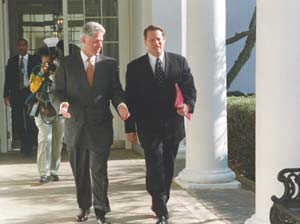
Clinton Administration's Use of Warrantless Wiretaps
There has been some discussion here and on other blogs about the position of the Clinton Whitehouse on wiretaps. Most of these refute the inflated claims that Al Bore made the other day. I think the following links will add more clarity to the issue.
Warrantless "National Security" Searches
The Clinton administration claims that it can bypass the warrant clause for "national security" purposes. In July 1994 Deputy Attorney General Jamie S. Gorelick told the House Select Committee on Intelligence that the president "has inherent authority to conduct warrantless searches for foreign intelligence purposes." According to Gorelick, the president (or his attorney general) need only satisfy himself that an American is working in conjunction with a foreign power before a search can take place.
John Schmidtt, former Assc. Atty. Gen. in Clinton DOJ.
" President Bush's post- Sept. 11, 2001, authorization to the National Security Agency to carry out electronic surveillance into private phone calls and e-mails is consistent with court decisions and with the positions of the Justice Department under prior presidents.".....
"We cannot eliminate the need for extraordinary action in the kind of unforeseen circumstances presented by Sept. 11," Schmidt continues. "I do not believe the Constitution allows Congress to take away from the president the inherent authority to act in response to a foreign attack. That inherent power is reason to be careful about who we elect as president, but it is authority we have needed in the past and, in the light of history, could well need again."
The Bush administration and Republicans on Capitol Hill say terrorist cells in this country are precisely what those FISA loopholes were intended for, even if they don't represent a traditional enemy state. .....In an interview yesterday, Miss Gorelick acknowledged her testimony before Congress but said it pertained to presidential authority prior to 1994, when Congress expanded FISA laws. Left unanswered, she said, is whether that congressional action trumped the president's "inherent authority." "The Clinton administration did not take a position on that," she said.

<< Home